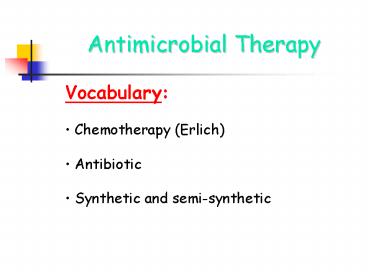Antimicrobial Therapy - PowerPoint PPT Presentation
1 / 45
Title:
Antimicrobial Therapy
Description:
Antimicrobial Therapy Vocabulary: Chemotherapy (Erlich) Antibiotic Synthetic and semi-synthetic Antimicrobial Therapy Selective Toxicity What s a good antibiotic? – PowerPoint PPT presentation
Number of Views:517
Avg rating:3.0/5.0
Title: Antimicrobial Therapy
1
Antimicrobial Therapy
- Vocabulary
- Chemotherapy (Erlich)
- Antibiotic
- Synthetic and semi-synthetic
2
Antimicrobial Therapy
- Very Brief History
- Erlich - Salvarsan
- Domagk - Prontosil (sulfa) prodrug
- Fleming, Chain, Florey - penicillin
- 1969 - government - all over
3
Selective Toxicity
Therapeutic Dose Toxic Dose Therapeutic Index
(TI) Toxic/Therapeutic
4
Whats a good antibiotic?
- soluble, not protein bound
- stable and unaltered in tissues
- good TI
- non-allergenic
- no resistance issues
5
Side Effects
- Toxicity
- Allergy
- Disruption of normal flora - a Z-pak with a
Diflucan chaser - hospital settings
6
Modes of Action
- Inhibit cell wall synthesis
- Disrupt the cell membrane
- Inhibit protein synthesis
- Inhibit nucleic acid synthesis
- Act as antimetabolites
7
Spectrum of Activity
Broad spectrum vs Narrow spectrum
8
Penicillin
9
Penicillins
10
Remember Peptidoglycan?
11
Penicillins
12
Penicillins
- blocks transpeptidase that crosslinks
peptidoglycan in the cell wall - often used for Streptococci (pneumonia,
meningitis), spirochetes - semisynthetics used if PenG resistance
- 5 of adults are allergic
- prophylactic for surgery
13
Cephalosporins
penicillins cephalorsporins
14
Cephalosporins
15
Cephalosporins
- broad spectrum good oral absorption
- expensive
- maybe a problem if penicillin allergic
- prophylactic for surgery
16
Other cell wall inhibitors
- carbapenems - very broad spectrum
- bacitracin - peptide, topical
17
Other cell wall inhibitors
vancomycin - Gram ()s, MRSA, IV
18
Cell membrane disrupters
- polymyxins - often topical, Pseudomonas,
fairly toxic internally
19
Protein synthesis inhibitors
- aminoglycosides
- tetracyclines
- macrolides
20
Aminoglycosides
- aminoglycosides - bind ribosomes -
streptomycin - neomycin - kanamycin -
gentamicin - tobramycin - synergistic use, often with penicillin
- special apps - hospital infections, joint
infections - toxicity with prolonged use
21
Tetracyclines
- tetracyclines - bind 30s ribosome -
tetracycline - doxycycline (Vibramycin) - widest spectrum - also causes problems
- good distribution in body including
intracellular - kidney and liver toxicity
22
Tetracyclines
Bad for a patients teeth Good for
bone research
http//pathology2.jhu.edu/bonelab
www.drjohnrutland.com
23
Macrolides
- macrolides - bind 50s ribosome -
erythromycin - azithromycin (Zithromax) - used especially on respiratory infections
- reaches high levels in tissues - long half-life
- emerging Zmax resistance
24
Quinolones
- quinolones - inhibit DNA synthesis DNA
gyrase - ciprofloxacin - moxafloxacin - last resort drugs - relatively wide spectrum
- urinary tract infections
- anthrax
25
Antimetabolites
- sulfa drugs - block folic acid synthesis --
sulfamethoxazole often in combo with
trimethoprim Bactrim or Septra - specific uses - CNS, Pneumocystis pneumonia
26
Antifungals
- imidazoles/triazoles - block membrane
sterol synthesis -- most used
topically miconazole (Monostat)
clortrimazole (Lotramin) -- some systemic
ketoconazole fluconazole (Diflucan) - skin fungal infections Candidiasis
27
Antivirals
- base analogs - mutations, feedback inhibition
-- ribavirin - uncoating -- rimantadine
- neurominidase inhibitors -- oseltamivir
(Tamiflu) - protease inhibitors (HIV) -- nelfinavir
nice link for mechanism of actionTamiflu
Mechanism of Action
28
Antibiotic Resistance in Hospitals
MG. Taubes, Science 321, 356 -361 (2008)
29
Resistance
- Physical Evasion
- Genetic Changes (mutations) - chromosomal -
plasmid mediated
30
Resistance Mechanisms
- target alterations
- membrane alterations
- enzyme action
- enzyme changes
- metabolic pathway changes
31
Penicillin Resistance
?-lactamase
32
Tetracycline Resistance
- tetracycline resistance - efflux pump
33
?-lactamases
Davies and Davies, MMBR 74, 417 -433 (2010)
34
Carbopenase and KP
http//www.cdc.gov/
35
Cipro Resistance in GC
MIC gt1 ?g/ml MIC 0.125 - 1 ?g/ml
Percentage of Neisseria gonorrhoeae isolates with
ciprofloxacin resistance
http//www.cdc.gov/std/gisp2007/default.htm
36
Cipro Resistance in GC
Distribution of Neisseria gonorrhoeae
ciprofloxacin MICs
http//www.cdc.gov/std/gisp2007/default.htm
37
Zithromax Resistance in GC
Distribution of Neisseria gonorrhoeae
azithromycin MICs
http//www.cdc.gov/std/gisp2007/default.htm
38
Limiting Resistance
39
Limiting Resistance
40
Limiting Resistance
41
Limiting Resistance
- use synergistic drugs - penicillin
streptomycin pentration - Augmentin
clavulanic acid (anti-?-lactamase
amoxicillin - dont use antagonistic drugs - tetracycline
penicillin tet slows growth - use drugs only in essential cases - NO
ANTIBIOTICS FOR COLDS!
42
Limiting Resistance
www.ehponline.org
43
FDA Antibiotics Approval
MG. Taubes, Science 321, 356 -361 (2008)
44
Innovation Gap in Antibiotics
M. A. Fischbach et al., Science 325, 1089
-1093 (2009)
45
Really New Stuff
Hacking Bacterial Communications































